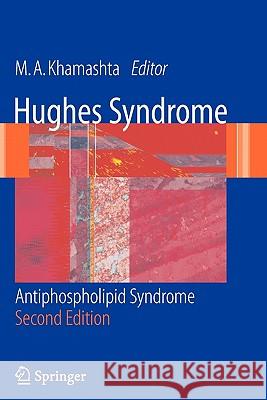Hughes Syndrome: Antiphospholipid Syndrome » książka



Hughes Syndrome: Antiphospholipid Syndrome
ISBN-13: 9781849969406 / Angielski / Miękka / 2010 / 598 str.
Hughes Syndrome: Antiphospholipid Syndrome
ISBN-13: 9781849969406 / Angielski / Miękka / 2010 / 598 str.
(netto: 421,70 VAT: 5%)
Najniższa cena z 30 dni: 424,07
ok. 16-18 dni roboczych.
Darmowa dostawa!
Eponymous volume edited by the investigator on the team which defined this syndrome"
"The order in which the topics are arranged is very practical. The high quality photographic figures with captions are informative and visually appealing. I like artwork on the hardbound cover. This book appears to be well-written and well-organized. It is a useful addition to my library, both for its content and as a thorough database of references on the topic of Hughes syndrome. Given the ongoing research and development of new knowledge in this field, the second edition is a welcome update." (Cory B Pittman, Doody Enterprises, Inc. - COPYRIGHT 2006)
Section 1: Clinical Aspects 1. Hughes Syndrome: History M. A. Khamashta 2. Antiphospholipid Syndrome: An overview David P. D’Cruz 3. Epidemiology of Antiphospholipid Syndrome Michelle Petri 4. Hemocytopenias in Antiphospholipid Syndrome Carlomaurizio Montecucco and Roberto Caporali 5. Cardiac Manifestations in Antiphospholipid Syndrome Josep Font and Ricard Cervera 6. Cerebral Ischemia in Antiphospholipid Syndrome Debendra Pattanaik and Robin L. Brey 7. Cerebral Disease other than Stroke and tia in Antiphospholipid Syndrome Giovanni Sanna 8. Skin Manifestations of Antiphospholipid Syndrome Carlos A. Battagliotti 9. Kidney Disease in Antiphospholipid Syndrome Mary-Carmen Amigo and Romeo García-Torres 10. Systemic Hypertension in Antiphospholipid Syndrome Shirish R. Sangle and David P. D’Cruz 11. Pulmonary Hypertension and Antiphospholipid Antibodies Jean-Charles Piette and Beverley J. Hunt 12. Osteoarticular Manifestations of Antiphospholipid Syndrome Maria G. Tektonidou and Haralampos M. Moutsopoulos 13. The Ear and Antiphospholipid Syndrome Elias Toubi and Aharon Kessel 14. The Eye in Primary Antiphospholipid Syndrome Cristina Castañon and Pedro A.Reyes 15. Primary Antiphospholipid Syndrome Tonia L. Vincent and Charles G. Mackworth-Young 16. Catastrophic Antiphospholipid Syndrome H. Michael Belmont 17. Obstetric Antiphospholipid Syndrome T. Flint Porter, Robert M. Silver and D. Ware Branch 18. Infertility and Antiphospholipid Antibodies Lisa R. Sammaritano 19. Transplantation of Solid Organs, Tissues and Prosthetic Devices in Patients with Antiphospholipid Antibodies Dawn R. Wagenknecht and John A. McIntyre 20. Antiphospholipid Syndrome in Children Lori B. Tucker and Rolando Cimaz 21. Ethnic and Geographic Variation inAntiphospholipid Syndrome Wendell A. Wilson and Elena Cucurull 22. Antiphospholipid Syndrome: Differential Diagnosis Beverley J. Hunt and Paul R. J. Ames Section 2: Laboratory Investigation 23. Anticardiolipin Testing Silvia S. Pierangeli 24. Lupus Anticoagulants: Mechanistic and Diagnostic Considerations Jef M. M. C. Arnout and Jos Vermylen 25. ß2-glycoprotein I and Anti-ß2-glycoprotein I antibodies Shinsuke Yasuda, Tatsuya Atsumi and Takao Koike 26. Antiprothrombin Antibodies Maria Laura Bertolaccini 27. Antiphospholipid Syndrome in the Absence of Standard Antiphospholipid Antibodies: Associations with Other Autoantibodies Robert A. S. Roubey Section 3: Basic Aspects 28. Vascular Pathology of Antiphospholipid Antibody Syndrome Gale A. McCarty 29. Placental Pathology in Antiphospholipid Syndrome Ann L. Parke 30. Antiphospholipid Syndrome – Experimental Models: Insight into the Etiology, Pathogenesis, and Treatments Miri Blank, Ilan Krause and Yehuda Shoenfeld 31. Antiphospholipid Antibody-Induced Pregnancy Loss and Thrombosis Guillermina Girardi and Jane E. Salmon 32. Mechanism of Thrombosis in Antiphospholipid Syndrome: Binding to Platelets Joan-Carles Reverter and Dolors Tàssies 33. Interaction of Antiphospholipid Antibodies with Endothelial Cells Pier Luigi Meroni, Elena Raschi, Cinzia Testoni, Arianna Parisio, Maria Gerosa and Maria Orietta Borghi 34. The Influence of Antiphospholipid Antibodies on the Protein C Pathway Philip G. de Groot and Ronald H. W. M. Derksen 35. Contribution of Tissue Factor to the Pathogenesis of Thrombosis in Patients with Antiphospholipid Syndrome Chary López-Pedrera, Francisco Velasco and Maria J. Cuadrado 36. Annexins in Antiphospholipid Syndrome Jacob H. Rand and Xiao-Xuan Wu 37. Plasminogen Activation, Fibrinolysis and Cell
The second edition of Hughes Syndrome: Antiphospholipid Syndrome addresses the complete range of conditions produced by this common disorder which is also known as APS or "sticky blood" syndrome. APS is one of the main causes of strokes (40%), leg deep vein thrombosis, and recurrent miscarriages in women. It is an important risk factor for thrombosis in women taking the oral contraceptive pill.
The effects of this syndrome were found initially in thrombosis, obstetrics (APS is the most common treatable cause of recurrent pregnancy loss) and neurology. Its impact is now felt in a diverse range of conditions. These include surgery (graft rejection), orthopedics (avascular necrosis, DVT), psychiatry (memory loss), cardiology (pulmonary hypertension, valvular disease, angina), ENT (vertigo), pediatrics (young strokes, epilepsy) to name but a few.
This new and updated text reflects the growth in published literature on APS and the widening ramifications of the disease. APS is a multi-specialty disease and is of increasing interest to obstetricians, rheumatologists, hematologists, dermatologists, neurologists and immunologists.
1997-2026 DolnySlask.com Agencja Internetowa
KrainaKsiazek.PL - Księgarnia Internetowa









